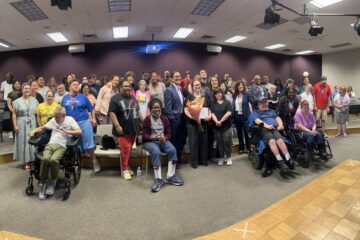Our elected leaders can’t overlook the intellectually disabled during COVID-19 -An Op-Ed by Kathy McHale
With all of the relief packages coming out of Washington, most Americans would believe that there has to be something set aside for the nation’s most vulnerable people.
People with developmental and intellectual disability whose needs are beyond their family’s ability to care for them on a 24/7 basis. People whose very lives depend on services from community provider organizations that are now in danger of closing. These organizations were seriously under-funded before the pandemic hit and are now stressed beyond their capacity to continue much longer.
As expenses rise and revenues fall, Pennsylvania organizations, almost entirely non-profits, have an average of 2.9 days of cash on hand and across the nation 55 percent report being unable to operate much longer if relief doesn’t come. Making matters worse Direct Support Professionals (DSPs) who are on the front lines of these services, earn less than livable wages due to underfunding. The shortage of DSPs was a known crisis pre-pandemic and the scary fact is the vacancy rate has doubled since March.
Pennsylvania is doing something, but nowhere near enough. With all services except Residential closed, a retainer based on 75 percent of an organization’s weekly revenue for Day Services is coming, but nothing for other necessary services.
Despite the fact the Federal Government is providing the state with 6.2% more in Federal matching funds, rates for Residential Services remain unchanged. Right now, the state is keeping that money for itself, rather than give a much-needed temporary increase to organizations. In New Jersey and other states, rates have increased in response to the crisis — at least temporarily.
The pandemic has hit these services hard, especially in the Philadelphia area. Often DSPs work two or more jobs on the front lines which increases their risk and the risk they could unknowingly spread the virus. Their job requires close contact with people; there is no such thing as social distancing.
Additionally, with no statewide coordinated effort to assist with PPE, it has been every provider for themselves. Left to scramble for even essentials such as masks, gloves, thermometers, disinfectants and paper towels, providers often find that items are scarce and shipments don’t come in as scheduled. All of which represent more unfunded costs.
The result is that people with disability who live in small community homes of three people or fewer are contracting the virus. This reality is made more tragic by the fact that many people with disability also have other underlying serious health conditions and still others are also elderly. People are dying. Thankfully in numbers and rates far lower than in most nursing homes, but any loss is too much.
It takes the continuity and care of skilled, knowledgeable Direct Support Professionals who have a relationship with each person to support them back to health. Without any additional revenue, providers must increase wages for Hero Pay because although Direct Support Professionals may love their jobs, they are unwilling to put their life and their family’s life on the line for $13, $14 or $15 an hour.
Families and their loved ones with disability need community providers to be here for them. Without us, they would be forced to return to state centers with higher costs and a low quality of life or go into nursing homes.
It is time to give these community services the help that is needed for the most vulnerable citizens of the Commonwealth. People’s lives are at stake. We are out of staff, out of money, out of PPE and out of time. If ever there was a time to help the most vulnerable, it is now.
Kathleen McHale is the president and CEO of the Philadelphia-based Special People in the Northeast (SPIN).


